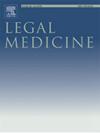毒品犯孟乔森代理综合症:我们何时敢于关心,为什么敢于关心
IF 1.3
4区 医学
Q3 MEDICINE, LEGAL
引用次数: 0
摘要
孟乔森代理综合症(MSP)一词指的是父母一方或双方导致或发明孩子没有的症状或疾病的情况。因此,儿童可能面临不断的医疗检查、测试和分析,包括可能造成严重伤害或在极端情况下造成死亡的手术。通常,受害者是一个年幼的孩子,而施暴者是母亲,通常孩子几乎完全被托付给母亲,使她处于模拟疾病的最佳位置。造成诊断困难的原因是病例发生率低、症状的非特异性、难以将过度治疗重新定位为刑事案件并将其追溯到护理人员。目的:从一个病例序列出发,开发了一种有助于快速识别MSP的诊断算法。对四个案例进行了详细的研究,所有案例都有一个共同的特征:药物管理以实施MSP。方法采集生物体液样本,分析可追溯症状的药物。结果所有病例均可根据毒理学分析结果进行晚期MSP诊断。虽然分析结果通常是诊断性的,但由于诊断算法不当,样品收集的延迟是经常发生的。只有在多方专业人员合作的基础上,其中法医专家和毒理学家的作用突出,采取综合办法,才能确保实现快速诊断和保护受害者。本文章由计算机程序翻译,如有差异,请以英文原文为准。
Drug-perpetrated Munchausen by proxy syndrome: When we dare and why we dare to care
Background
The term Munchausen syndrome by proxy (MSP) refers to a situation in which one or both parents by procuring or inventing symptoms or illness that their children do not have. As a consequence children can be exposed to continual medical examinations, tests and analyses, including surgery that can severely injure or, in extreme cases, provoke death. Usually, the victim is a young child, and the perpetrator is the mother, usually the person child is almost exclusively entrusted, placing her in the best position to simulate illness. Difficulty in making a diagnosis is motivated by the low prevalence of cases, unspecific nature of the symptoms, difficulty of reconducting the overcure back to a criminal case and tracing it back to the care giver.
Objective
Starting from a case series, a diagnostic algorithm useful for prompt MSP identification has been developed.
Participants and setting
A detailed examination of four cases is given, all with a common feature: drug administration to perpetrate MSP.
Methods
Biological fluids have been sampled and analyzed for drugs to which symptomatology could be traced.
Results
In all presented cases a late MSP diagnosis was possible on the base of results from toxicological analyses. Although analytical results are often diagnostic, a delay in sample collection, related to improper diagnostic algorithm, is frequent. Only an integrated approach, based on collaboration among multiple professionals, among which the role of the medico-legal expert and toxicologist stands out, can ensure the achievement of a rapid diagnosis and the protection of the victim.
求助全文
通过发布文献求助,成功后即可免费获取论文全文。
去求助
来源期刊

Legal Medicine
Nursing-Issues, Ethics and Legal Aspects
CiteScore
2.80
自引率
6.70%
发文量
119
审稿时长
7.9 weeks
期刊介绍:
Legal Medicine provides an international forum for the publication of original articles, reviews and correspondence on subjects that cover practical and theoretical areas of interest relating to the wide range of legal medicine.
Subjects covered include forensic pathology, toxicology, odontology, anthropology, criminalistics, immunochemistry, hemogenetics and forensic aspects of biological science with emphasis on DNA analysis and molecular biology. Submissions dealing with medicolegal problems such as malpractice, insurance, child abuse or ethics in medical practice are also acceptable.
 求助内容:
求助内容: 应助结果提醒方式:
应助结果提醒方式:


